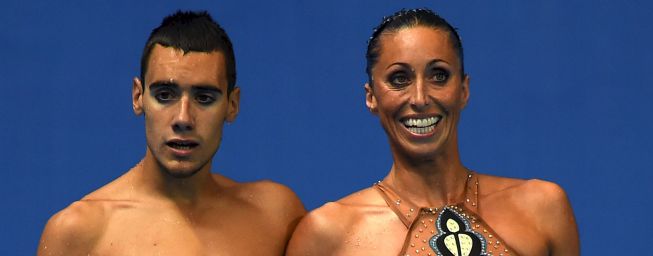—How was the experience and the return at age 38?
—I am satisfied with having made this decision. In synchro, I have experienced everything but this is different. I started from scratch with Pau Ribes and I had to teach him. It was a beautiful process. Taking it patiently and transforming it. I saw potential and I took a chance. I was brave and the combination of these things makes me feel good.
—What did the judges tell you?
—They told me that if I had had another partner, maybe I would have won a medal. But I don't care. The process has fulfilled me, I wouldn't change anything.
—And what will happen to Pau now?
—I encourage him to continue. We will find him a partner and offer to train him.
—You achieved fifth place, the same as the Olympic routines in this World Championship. What is your assessment of Spain's decline?
—Many things have been said. I told my cousin that we have girls who still lack something. They do things that perhaps they don't yet master and we are trying to help them achieve it as soon as possible. Maybe they don't have that innate talent and they need to learn. They have to go through this phase. Maybe it will take four years, but there are talented girls behind them too. We have to be patient.
—You are also part of the coaching staff. Do you consider that the transition has been managed in the best possible way?
—We are dealing with what we have. Marga Crespí, Andrea Fuentes, Thais Henríquez... They're gone. Ona is perhaps the only mature and talented swimmer we have from before.
—What do you think of the decision that Ona Carbonell only competes in solo and duet?
—I did it all because I wanted to. If I could rest on the technical day, I rested. I liked being part of a team and Ona also likes it. But this year she wanted to take a break because the Olympics are coming in a year. Soloists from other countries have also done it more times and it's okay.
—Would you have liked to take a break in a World Championship too?
—I would have liked to do it and it would have been good for me. It's very tough. Voloshina, from Ukraine, does it all and I think, 'poor girl'. It's very tough. I remember it and it was insane. This year Ona needed rest because she came from three very tough years. In addition, this way the girls on the team step up. You can count on some more and it creates competition.
—What do you think of the 3.5 points difference in the duet compared to China?
—I was lucky because it went well with Paola Tirados and Andrea picked up the pace quickly. Maybe she had a better technical foundation. Ona's duet partners are good but maybe they haven't balanced each other, and that takes time.
—Do you see winning a medal at the Rio Olympics as achievable?
—In a year, you can narrow the gap, although a medal is very difficult. Nothing is impossible. The girls have to think they can do it.
—How do you see the future?
—In the end, in synchro, we never stop striving for excellence. Anyone can go through stages like this. It is necessary to renew and reinvent yourself, find solutions. That's how sports work. I ask for support and we can do it.

